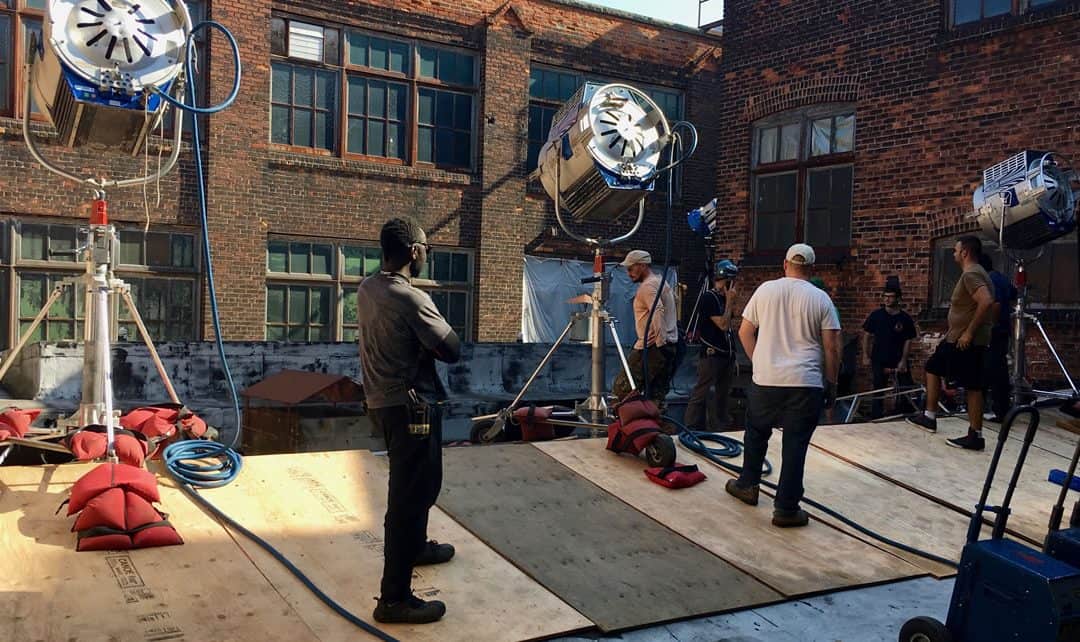Raw warehouse space is a movie, television and music video location staple. But these vintage spaces are getting harder to find as buildings are demolished, redeveloped or converted into condominiums.
Two historic Hamilton, Ont. buildings are on the way to being converted into lofts by Stinson Properties, but before they are, production companies are flocking to film there.
“The kind of space we have is what (film) people are looking for,” says Peter Scott, director of business development, who manages the two buildings on behalf of Stinson.
The former Cannon Knitting Mills building on Mary Street offers more than 110,000 square feet. It was built in the mid 1800s and was an iron foundry, then a cotton mill. It was functional until about a dozen years ago, Scott says. “The massive building has a New York 1970s warehouse look.”
The property has multiple buildings that all look different, which is a bonus for production companies looking to shoot multiple backdrops at the same place.
Gibson School on Barton Street East offers exposed brick walls and high ceilings. It also has lots of parking for production vehicles.
The downtown location of both is close to amenities, including restaurants, and has easy access to highways.
Locations managers hear about the buildings through word of mouth, or see details on the Stinson Properties website, says Scott, who joined the small team three years ago after working as a production manager with Canada Post’s retail operations. He says the Hamilton film business continues to grow.
Demand for the two Stinson buildings is strong, Scott says. “Just yesterday four different productions came in to see the space.”
Finding raw warehouse space isn’t easy. “It doesn’t exist in Toronto, where buildings have been redeveloped, torn down or converted into condos.”
Hamilton is also easier to get around than larger urban centres, and tax credits are also beneficial to productions.
Renting the otherwise empty buildings brings in extra revenue. “It’s a good match for us,” Scott says. In fact, “we will keep some space for filming.”
The list of productions shot in the two buildings includes Murdoch Mysteries, Titans, 12 Monkeys, Slasher, Frankie Drake and a number of music videos.
Scott says you have to be flexible in availability because filming works around the clock but it’s a good opportunity for owners whose buildings might otherwise sit empty. Properties can be registered on a film locations list with the local municipality’s film office. Scott also suggests getting to know location managers because once they know about a good location, they’ll keep coming back. “We love working with the industry,” he says.
The film industry component came about by chance, but Harry Stinson is not new to the world of entertainment. In the past he has co-produced festivals and major concerts that included such artists as Harry Chapin, George Thorogood and Dire Straits.
Stinson was also among the first to create residential lofts in unusual spaces, including the conversion of the former Ce De Candy Co. (maker of Rockets) factory. The Candy Factory Lofts is one of the earliest hard loft conversions in Toronto.
Scott is project managing Gibson Loft Rentals, which will include construction of a tower and underground parking at one end of the site and a retail component, commercial space and space for filming in another. The project will be completed in phases.
It is four blocks from the James Street North area and will suit creative buyers looking for a vibrant place to live. “It will be a dynamic building with lots of things going on at once. It will be a fun building,” Scott says.
The former knitting mill, which will be known as Beasley Park Lofts, will offer suites with open space, exposed brick, large windows, a bathroom and a modern kitchen.
In 2018, 811 film permits were issued, with direct spending of just under $60 million, according to Hamilton’s film office.
Connie Adair is a contributing writer for REM.















